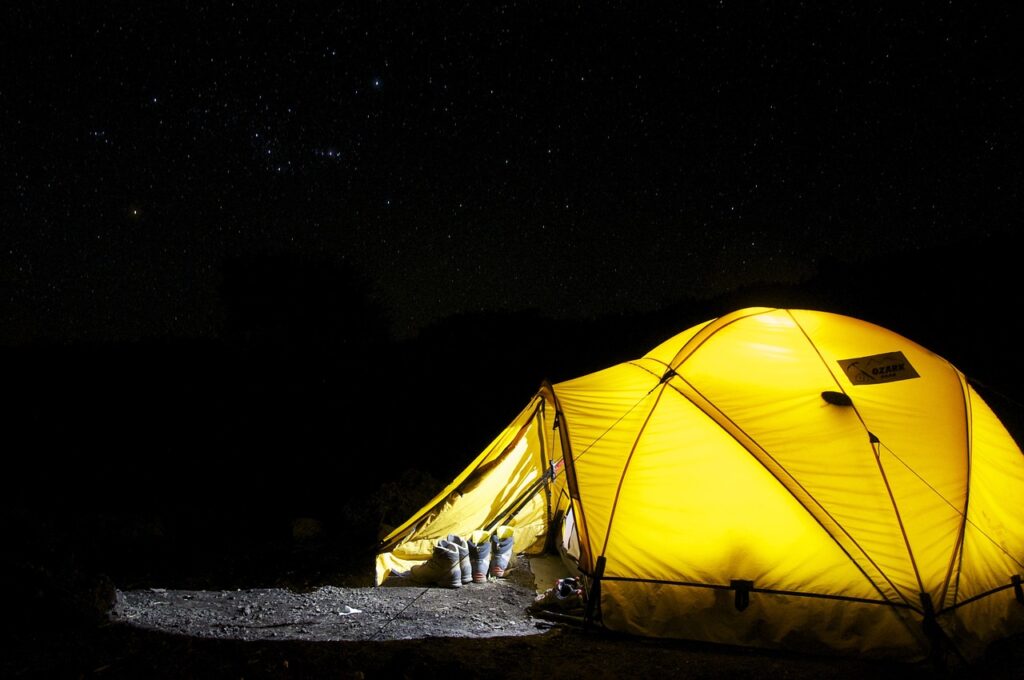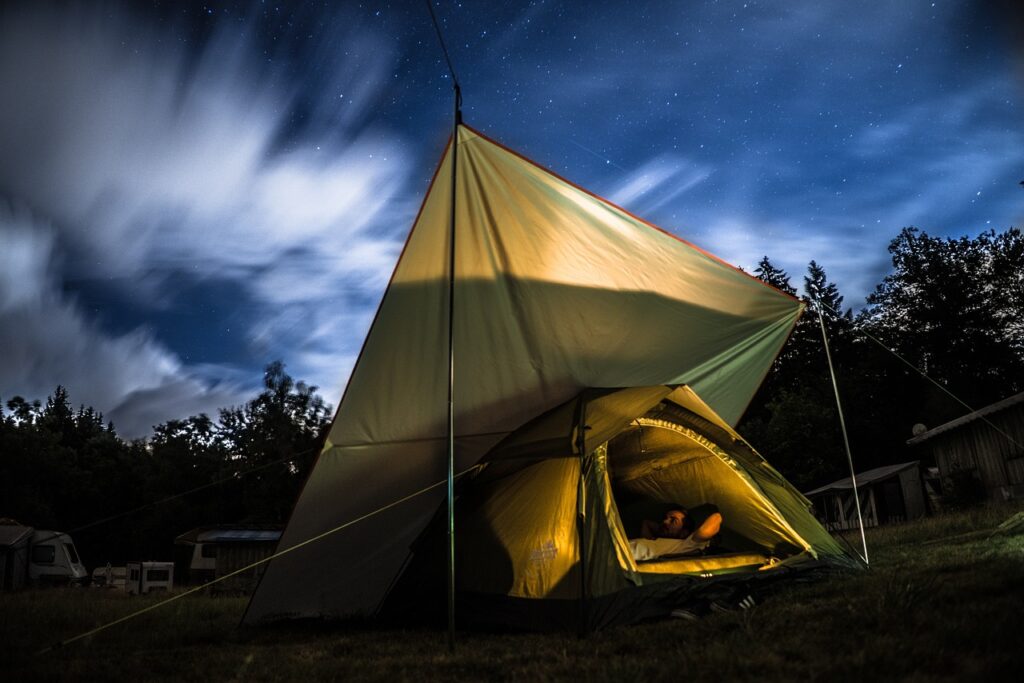Table of Contents
Camping is a popular activity that allows people to connect with nature and escape from the hustle and bustle of everyday life. One of the most important pieces of equipment for any camping trip is a tent. A good camping tent should provide shelter, protection from the elements, and a comfortable place to sleep.
When choosing a camping tent, there are several factors to consider. The first factor is the capacity of the tent. Consider how many people will be using the tent and choose a tent with enough room for everyone to sleep comfortably. It’s important to also consider how much gear you will be bringing with you, and if you will need extra space for storage.
The second factor to consider is the seasonality of the tent. Think about the time of year you will be camping and choose a tent that is suitable for the weather conditions. Three-season tents are good for spring, summer and fall, while four-season tents are designed for colder weather and are sturdier. This will ensure that you have the proper protection from the elements and are comfortable throughout your camping trip.
The third factor to consider is the size of the tent. Decide on how much space you want in the tent and choose a size that fits your needs. It’s important to have enough room to move around and store your gear, but you also don’t want a tent that is too large and difficult to set up.
The fourth factor to consider is the weight of the tent. If you plan on backpacking, weight is an important factor to consider. Look for a tent that is lightweight and easy to pack. This will make it easier to carry on your hike and set up at your campsite.
The fifth factor to consider is the brand of the tent. Research different tent brands and read reviews to find a tent that is known for its quality and durability. Investing in a quality tent from a reputable brand can ensure that your tent will last for many camping trips to come.
The final factor to consider is the price of the tent. Set a budget and compare prices to find a tent that fits your needs and budget. It’s important to remember that the most expensive tent is not always the best option, and it’s possible to find a high-quality tent at a reasonable price.
How to Choose
When choosing a camping tent, consider the following factors:
Capacity
Capacity is an important factor to consider when choosing a camping tent. The capacity of a tent refers to the number of people it can comfortably accommodate. When choosing a tent, it’s important to consider not only the number of people who will be sleeping in it but also the amount of gear that will be stored in it.
When looking at the capacity of a tent, you will often see it listed as a number, such as “2-person” or “4-person”. This number refers to the number of people who can sleep in the tent comfortably. However, it’s important to note that this number is not always an accurate representation of the amount of space in the tent. A 2-person tent may have enough room for two people to sleep, but not enough room for two people to sit up comfortably or store their gear.
When choosing a tent, it’s important to consider how much space you will need for sleeping and storing gear. If you plan on bringing a lot of gear with you, you may want to consider a tent with a larger capacity or one that has additional storage space. Additionally, if you are tall or prefer more space to move around, it’s good to look for a tent with a higher peak height.
Another thing to keep in mind is that people have different comfort levels when it comes to how close they like to sleep to others. Some people prefer to have more space between them and their tentmates, while others are comfortable with less space. Take this into account when choosing a tent with the appropriate capacity.
In summary, capacity is an important factor to consider when choosing a camping tent. It’s important to consider not only the number of people who will be sleeping in the tent but also the amount of gear that will be stored in it. Take into account your comfort level and the space you need for sleeping and storing gear to find a tent with the appropriate capacity.
Seasonality
When choosing a camping tent, seasonality is an important factor to consider. The seasonality of a tent refers to the time of year that it is designed for and the types of weather conditions it can withstand. Understanding the seasonality of a tent can ensure that you have the proper protection from the elements and are comfortable throughout your camping trip.
Three-season tents are the most common type of camping tent and are designed for use in spring, summer, and fall. These tents are typically made with lightweight, breathable materials and are well-ventilated to keep you cool during the warmer months. They also have a rainfly that can be added to provide protection from rain and wind. Three-season tents can also have mesh walls that provide a good view of the outdoors and allow for good airflow.
Four-season tents, also known as mountaineering tents, are designed for colder weather and are sturdier than three-season tents. They are typically made with thicker, more durable materials and have a stronger frame to withstand strong winds and heavy snowfall. They also have more mesh windows, which can be covered to retain heat inside the tent. Four-season tents also have a full coverage fly that can be added for added protection from the elements.
It’s important to note that a four-season tent is not necessarily better than a three-season tent, it depends on the environment you will be camping in and the weather conditions you expect. A four-season tent may be overkill for a summer camping trip, while a three-season tent may not provide enough protection in the winter. Therefore, it’s important to match the seasonality of the tent to the conditions you expect to encounter on your camping trip.
In addition to the seasonality, it’s also important to consider the tent’s ventilation, waterproofing, and overall design. Always make sure to read the product description and reviews, and look for a tent that has the features you need for the conditions you will be camping in.
Size
Size is another important factor to consider when choosing a camping tent. The size of a tent refers to the amount of space it provides for sleeping and storing gear. When choosing a tent, it’s important to consider not only the number of people who will be sleeping in it, but also the amount of gear that will be stored in it, and how much space you want to have for yourself.
When looking at the size of a tent, you will often see it listed as a number, such as “2-person” or “4-person”. This number refers to the number of people who can sleep in the tent comfortably. However, it’s important to note that this number is not always an accurate representation of the amount of space in the tent. A 2-person tent may have enough room for two people to sleep, but not enough room for two people to sit up comfortably or store their gear.
When choosing a tent, it’s important to consider how much space you will need for sleeping and storing gear. If you plan on bringing a lot of gear with you, you may want to consider a tent with a larger capacity or one that has additional storage space. Additionally, if you are tall or prefer more space to move around, it’s good to look for a tent with a higher peak height.
Weight
The weight of a tent refers to how much it weighs and can have a significant impact on your overall camping experience. When choosing a tent, it’s important to consider not only the weight of the tent itself, but also the weight of the other gear you will be carrying with you.
When it comes to weight, there are two main types of camping tents: backpacking tents and car camping tents. Backpacking tents are designed to be lightweight and compact, making them easy to carry on a backpacking trip. They are typically made with lightweight materials, such as nylon or polyester, and have a minimalist design that reduces the overall weight of the tent. Backpacking tents can weigh as little as 2 pounds, making them a great option for hikers and backpackers.
Car camping tents, on the other hand, are designed to be used in a car-camping setting where weight is less of a concern. They are typically larger and more spacious than backpacking tents, and often have additional features such as multiple rooms, extra windows, and a higher peak height. Car camping tents can weigh as much as 20 pounds, making them less suitable for backpacking but ideal for car camping trips where you don’t have to carry the tent far.
When choosing a tent, it’s important to consider the type of camping trip you will be taking and the weight of the other gear you will be carrying with you. If you plan on backpacking, it’s important to choose a lightweight tent that won’t add too much weight to your pack. On the other hand, if you plan on car camping, weight may be less of a concern, and you can choose a larger, more spacious tent.
It’s also worth noting that a lighter tent may not always be the best choice. A lighter tent often comes with a trade-off in terms of durability and weather resistance. So it’s important to also consider the seasonality and weather conditions you expect to encounter on your camping trip.
Brand
Research different tent brands and read reviews to find a tent that is known for its quality and durability. The brand is also an important factor to consider when choosing a camping tent. Different brands offer different features, designs, and quality levels. When choosing a tent, it’s important to research the different brands and compare the features and specifications of their tents to find the best option for your needs.
Some popular camping tent brands include Coleman, Marmot, North Face, REI, and MSR. These brands have a reputation for producing high-quality, reliable tents that are built to withstand different weather conditions. They offer a variety of tent styles, from backpacking tents to car camping tents, and have a range of options in terms of capacity, weight, and other features.
When researching tent brands, it’s important to read reviews from other customers to get an idea of the overall quality and performance of the tents. This can give you a better understanding of the strengths and weaknesses of the different brands, and help you make an informed decision.
In addition to the brand, it’s also important to consider the warranty and customer service offered by the company. A good warranty can provide peace of mind in case something goes wrong with your tent, and a responsive customer service team can help you with any issues or questions you may have.
Price
Price is an important factor to consider when choosing a camping tent. The price of a tent can vary greatly depending on the brand, features, and quality. When choosing a tent, it’s important to consider not only the initial cost but also the value that the tent will provide over time.
Camping tents can range in price from under $50 to over $500. Generally speaking, the more expensive the tent, the more features it will have, such as a greater capacity, more durable materials, and better weather resistance. However, this is not always the case. Sometimes, a more expensive tent may not be as durable or as well-designed as a less expensive one.
When considering the price of a tent, it’s important to set a budget and then compare the features and specifications of the different tents within that budget. It’s also important to consider the long-term value of the tent. A higher-priced tent may cost more initially, but it may last longer and provide better performance over time, making it a better value in the long run.
It’s also worth noting that there are many different types and styles of camping tents available on the market, so it’s important to consider your specific needs and preferences. For example, if you’re planning on backpacking, a lightweight, compact tent will be a priority, while if you’re planning on car camping, you may be able to afford a heavier, more spacious tent.
Last Words
In conclusion, choosing a camping tent is an important decision that requires careful consideration of several factors. By considering the capacity, seasonality, size, weight, brand, and price of a tent, you can ensure that you find a tent that is suitable for your needs and preferences.
Ultimately, it is important to find a tent that fits your specific needs and preferences. It’s good to try it out and set it up before purchasing. A good camping tent can make all the difference in ensuring that your camping trip is comfortable, safe, and enjoyable.



